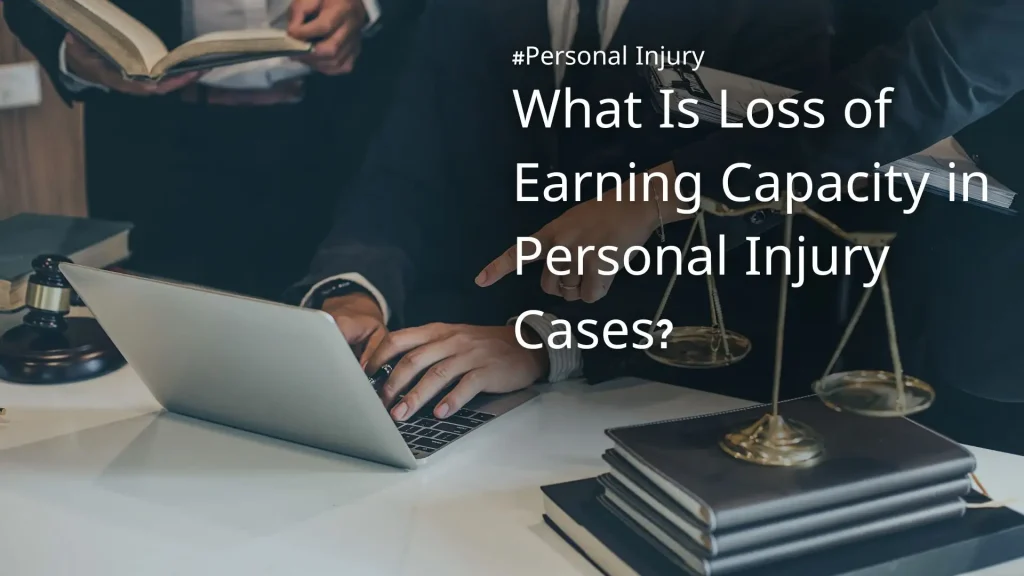Posted on Monday, July 15th, 2024 at 4:48 pm

Loss of earning capacity refers to an individual’s lessened ability to work due to injuries sustained in an accident. These injuries are caused by another party’s negligence. It’s different from lost wages, another legal concept in personal injury cases, which refers to the actual lost income.
If you suffered a severe injury in Georgia because of someone else’s actions, determining your loss of earning capacity is crucial for your compensation claim. You may not receive the compensation you deserve without properly valuing your losses. Seek advice from an experienced Georgia personal injury lawyer at Jonathan R. Brockman, P.C..
Loss of Earning Capacity Damages
What is a loss of earning capacity? Loss of earning capacity is one of several damages for which you can seek compensation through a personal injury claim. This compensation is for the gap in your pre-injury and post-earning injury capacity, which depends on factors such as your pre-injury income, line of work, level of education, and the severity of your injuries.
Proving Loss of Earning Capacity in Georgia
How can you prove your loss of earning capacity after an injury? An experienced personal injury attorney can assist you in gathering the following:
- Medical Evidence – Your medical records and the testimony from medical experts serve as vital evidence supporting the severity of your injuries. Your documents will detail your injuries and the treatments you’ve undergone and may also include the potential long-term physical impacts of those injuries. A medical professional may be able to provide further insight.
- Employment History – Your work history, including your past earnings, job skills, and career trajectory, is crucial for determining the baseline for your diminished earning capacity. With this information, your attorney can estimate your lifetime earnings if you never suffered your injury.
- Vocational Experts – Job experts provide insight into how your injuries will affect your job prospects. They consider your injury, education, training, experience, and even the current job market. If your injuries mean you can’t get a job in the same field that you worked in before and don’t have any other experience, your lost earning capacity may be more significant.
- Financial Experts – An economic expert can help determine the financial impact of your injuries. They’ll consider economic damages, inflation, employment history, projected wage increases, and work-life expectancy.
Challenges to Loss of Earning Capacity Claims
Nobody can know what the future job market or your future income and work trajectory would have looked like without your injuries. Because of this, determining your loss of earning capacity because you’re unable to work is somewhat speculative, which the defense attorneys may jump on.
They may argue that you were already in a declining industry. Additionally, they would say that you would have had to change jobs at some point anyway. Or they may claim that you had a pre-existing injury that contributed to your loss of earning capacity for which their client should not be liable.
These reasons are why you need an experienced attorney and why gathering evidence supporting your claim is essential. The insurance company will try everything it can to discredit your claim so they can limit the compensation they need to pay out to you.
How an Attorney Can Help

Choosing the right attorney for your case is essential. Your attorney will provide vital assistance throughout your case, including by:
- Investigating Your Case – Your attorney will investigate your injury’s circumstances and determine the party or parties at fault.
- Gathering Evidence – Your attorney will gather evidence supporting your claim. This includes your medical and work records, photographs of the accident scene, and eyewitness statements.
- Hiring Expert Witnesses – Your attorney will hire expert witnesses to provide testimony on your medical condition, finances, and work prospects. This is to establish your loss of earning potential and other damages.
- Negotiating with Insurers – There will most likely be settlement negotiations with the insurance company before your case goes to trial. Your attorney will represent you in these negotiations to make sure you get a fair settlement offer. They will also stop the opposing counsel from taking advantage of you.
- Litigating Your Case – If you and the defendant cannot agree on a settlement amount, your case will go to trial. At this point, your attorney will present your case’s evidence before a judge and jury. They will then seek the maximum compensation available.
Contact Our Atlanta, Georgia Personal Injury Attorney
Were you injured due to someone else’s negligent actions in Atlanta, Georgia? Contact Jonathan R. Brockman, P.C. online or at 770-205-8887 for a free consultation with one of our experienced personal injury attorneys. Our attorneys will evaluate your case, explain your legal options, and assist you in determining the value of your loss of earning potential. The law firm has experience in dealing with similar notable cases with favorable results.
Related Posts:
What to Do After an Accident That Is Not Your Fault in Georgia
Economic vs Non-Economic Damages: What’s the Difference in Georgia?
